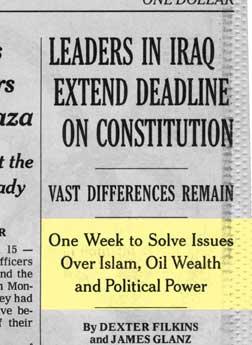Although it wasn't really my intention when I started this thing, much of what I have written has been concerned with international relations. I have, however, tried to avoid discussing only the "big stories" (like Iraq and Israel-Palestine), but also to look at others which attract less attention (particularly Uzbekistan and Diego Garcia). Continuing in this tradition I have decided to start a new series looking at little known conflicts around the world. This may include (perhaps, maybe, if I don't abandon the idea)
Aceh,
Colombia, the
Democratic Republic of Congo and
West Papua. I should stress that I'm not an expert on any of these conflicts and I'm likely to make the occasional mistake, but I'm hoping that this will be outweighed by what we learn along the way. Anyway, on with the first entry in the series: Western Sahara.
Western Sahara is Africa's only remaining colonised country, having been under Moroccan occupation since 1975. Despite having never been able to enjoy their independence and having been condemned to exile for thirty-years, the Saharawi people continue to resist and assert their right to self-determination.
Spain took control of what would then become "Spanish Sahara" in 1884. They faced stiff resistance from the Sharawis from the beginning and were not able to assert full colonial rule until 1936. Even then Spain seems to have been largely disinterested in developing the country, at least until the natural resources of the territory (primarily phosphate) became evident.
In 1966, the move towards decolonisation was in full-force and the UN called on Spain (then ruled by
General Franco) to organise a referendum on independence, but this never took place, although the Spanish would eventually - and apparently quite reluctantly - carry out a census ostensibly in preparation for such a plebiscite. Saharawis organised large demonstrations calling for independence. These came to an end on June 17, 1970 when a protest in Zemla (El Aaiun) was brutally crushed; many were killed and hundreds arrested. In 1973
Polisario (the Popular Front for the Liberation of Saguia el Hamra and Rio de Oro) was formed and began an armed struggle against Spanish forces.
There were a number of competing claims to sovereignty over Western Sahara and in 1974 the UN General Assembly adopted a resolution requesting an opinion from the International Court of Justice (ICJ). The ICJ ruled, in October 1975, that although a number of tribes in pre-colonial Western Sahara had some alleigances to the Moroccan sultan, there were no ties which prevented the country from asserting its right to self-determination. Despite this, Morocco announced that 350,000 volunteers would cross the border into Western Sahara on a "
Green March". This took place on November 6, but the volunteers were replaced with soliders within days. On November 14 as Franco lay on his death bed, Spain signed a secret agreement handing the territory over to Morocco and Mauritania.
As Morocco advanced, thousands of Saharawis fled into the desert, setting up make-shift refugee camps. A number tried to stay in Western Sahara, but came under attack from Moroccan aircraft which the Red Cross reported were using napalm. Eventually thousands of refugees reached Algeria where the government ceded control over part of its territory to Polisario who set up and organised their own refugee camps.
Polisario, who declared the formation of the
Saharawi Arab Democratic Republic (SADR) in February 1976, shifted its struggle towards the new occupiers, but concentrated its attacks on the weaker Mauritania, forcing them to enter talks and withdraw in 1979. Moroccan forces greatly outnumbered those of Polisario and were soon in control of the whole country, forcing the Saharawis to revert to guerilla warfare.
From 1980 onwards Morocco began building a
fortified wall - protected by minefields and artillery - to enclose the the occupied territory. The wall is now 2,500 km long (which makes it longer than Israel's
security barrier/apartheid wall around the West Bank or the Berlin wall) and encloses two-thirds of Western Sahara (see map above for route).
Diplomatic pressure on Morocco grew during the 1980s and in 1991 a ceasefire overseen by the
UN Mission for the Referendum in Western Sahara (MINURSO) came into effect. Morocco, however, did what it could to delay and disrupt any hopes of a referendum, knowing that a free vote would go against it. In August 1991, they presented a list of 120,000 Moroccan settlers resident in Western Sahara who were not included in the Spanish census (because they had only moved to the territory after it was invaded) but whom the Moroccans insisted were eligible to vote. Although it was a flagrant attempt to stack the vote and retain control over the territories (cf the use of settlements for demographic engineering
elsewhere in the world), the UN endorsed the Moroccan list. After this little happened until the appointment as a special UN representative of former US Secretary of State
James Baker in 1997. This breathed new life into the peace process and for a while the referendum looked more likely.
In 2003 the latest UN plan was unveiled. This asked Polisario to accept the presence of 200,000 Moroccans in the territory, which they did in the hope of getting things moving again and under some pressure from their Algerian allies. Nonetheless, Morocco rejected the deal outright. Baker became so frustrated that he resigned in June 2004. Since then there have been few developments in the peace process, but there has been a growing trend for governments to formally
recognise the SADR, with over 70 now doing so, South Africa which took the step in September 2004 being only the most prominent.
May-June this year saw a
popular uprising, widely described as an
Intifada, on the part of many Saharawis. The uprising began as a relatively small protest in El Aaiun calling for respect for human rights, but large numbers of ordinary Saharawis took the streets, calling for an end to the occupation. Met with Moroccan resistance, protests spread to other Saharawis towns and even to several Moroccan universities. It is unlikely that these protests portend the final days of the Moroccan occupation, but they do show that Saharawis reject it and that they will not sit back and allow it to continue unhindered.
Like so many conflicts around the world, the occupation of Western Sahara is driven by a desire to control natural resources, in this case phosphate and
oil (the latter being something Polisario appear to be trying to use to their advantage by
offering exploration licences which will become valid once they take power). This coupled with institutional inertia and national pride has prevented Morocco from leaving. Its position in the country, however, appears to be shaky (even many of the Moroccan settlers would apparently like to see Western Sahara become independent) and a little bit of international pressure on Morocco and solidarity with the Saharawis could go a long way.
You can find out more
here, get the latest news
here and get involved
here.
 Caption: "A young man walks through chest deep flood water after looting a grocery store in New Orleans on Tuesday, Aug. 30, 2005."
Caption: "A young man walks through chest deep flood water after looting a grocery store in New Orleans on Tuesday, Aug. 30, 2005." Caption: "Two residents wade through chest-deep water after finding bread and soda from a local grocery store after Hurricane Katrina came through the area in New Orleans, Louisiana."
Caption: "Two residents wade through chest-deep water after finding bread and soda from a local grocery store after Hurricane Katrina came through the area in New Orleans, Louisiana."























